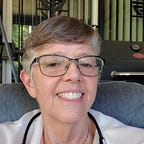Why I Do What I Do
A Career Mystery Solved
So, what are you going to do when you’re not working 50 hours a week?Lorna asked.
I was sitting with my once-a-year client having our annual pre-work-catch-up-on-the-previous-year chat. With slowing down and future retirement on my mind, I asked Lorna, who is two years my junior, if she’d thought about chucking it all in, especially since her husband retired years ago. She admitted that, for the first time last year, thoughts of retirement flitted across her mind. She’s thinking maybe in three or four years. I’m thinking two or three for me.
Everyone asks the question What are you going to do? as if working is the only thing to do. I know Lorna is merely curious though. We don’t know enough about one another personally for her to already know the answer to that question.
Write, I replied, and photography.
I went on to mention Medium. She didn’t know of it and scribbled a quick note to remind herself to check it out. Fortunately, I’ve never written about her in my stories and, if I had, there’d be nothing negative. She’s one of my favorite clients.
She leans back in her chair, runs her thin fingers through her short hair, and looks questioningly at me.
Writing and photography. Hm, I wouldn’t have guessed that answer from a numbers person. How did you end up doing bookkeeping for a living?
I’ve covered that answer on Medium before but gave her the shortest version I could: I fell into it. Well, tumbled slowly is more accurate. Turns out I was good with figures and organizing information, and it paid the bills.
But what about your love of writing and photography? Where were they while you were juggling figures?
I took a swig of water and replied:
Well, photography is new. But, my love for writing started when I was a child. I wrote a little in my 20’s but then my interest died, probably killed by too much work, too little time, and too many responsibilities, and not knowing what to do with it. Just writing and hiding the words in a notebook seemed senseless. Then, I discovered Medium two years ago. Now I have a home for my writing.
I spent the next two hours reviewing her financials for last year, researching issues, making adjustments, doing the numbers thing that I do. Making sure the figures made sense and everything balanced.
For days after our conversation and the question about why I do what I do twirled in my mind. Yes, the answers I gave are true, but why am I comfortable with it?
Why was a creative-sort-of-girl okay with a life of numbers?
I didn’t particularly like math in school. My grades were excellent but my interest was nearly nonexistent. I loved English, literature, creative writing, history, and psychology. My intention was to be an English teacher, preferably at a community college, who wrote articles and books.
After all, wasn’t I a creative? Wasn’t I meant to teach and create?
Then, how in the hell did I end up juggling numbers for a living?
The answer came to me today — as I was reviewing another client’s financial statements for last year. My review of the figures was over. Bank accounts were balanced. Adjustments were made. The financial statements in front of me were in perfect form. The numbers dark against the white paper lined up perfectly in columns. The figures made sense. I could justify each and every one of them. They were orderly and unquestionable.
That is when I knew that my life of figures was the result of an uncertain childhood.
My mother died when I was two months old. My father remarried when I was two years old and my stepmother left when I was four. My older sister took over the mothering duties but was gone before I turned eight. Life was unpredictable, unnerving, unsure.
My father added to my fear of the unknown. He was a blamer. For him, there were no accidents, no oops, no unintended mistakes. A glass of water inadvertently spilled was an intentional act. Breaking a lamp while dusting was a premeditated action. Losing glasses wasn’t an unfortunate incident, it was a willful and deliberate exercise in juvenile irresponsibility punished by living for years unable to see more than a few yards ahead and seated at the front of every classroom.
I spent my childhood checking and double-checking and triple-checking each action I performed. Did I lock the door? Check, check again, check once more. Did I turn off the water? Check, check again, check once more.
Drinking glasses and teacups were placed in the same location at each meal to lessen the chance of my hand accidentally swiping one to the floor. I made notes of the smallest responsibilities so nothing would be forgotten. Each task done methodically, carefully, obsessively. No mistakes, no accidents.
I must be perfect.
Numbers were the natural extension of my childhood. Numbers, unlike words, were exact. Two was two. There are no synonyms for numbers. A number is what it is.
Numbers are tidy and precise. Unless you work with advanced mathematics, which I do not, numbers add up consistently and reliably. Two plus two equals four. The sum of ten numbers in a column will always be the same unless one of the numbers changes.
Numbers make sense, they are scientific, they don’t leap about or jump around. They sit quietly meaning what they mean — always. Mistakes are clear and correctable, not messy and irreparable.
Numbers make sense of the insensible. Figures bring clarity to the unreasonable, always giving answers, never leaving loose ends, consistently consistent. Numbers bring closure.
